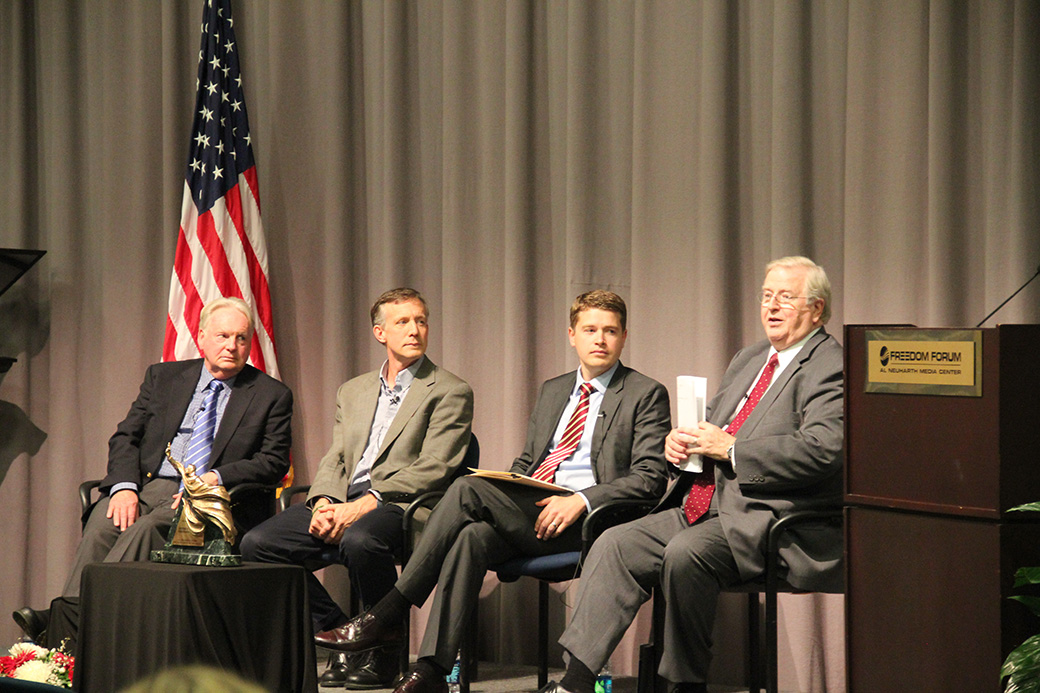
Al Neuharth Award recipient Peter Prichard talks media, digital age
Peter Prichard, former editor of USA TODAY, was awarded the 2014 Al Neuharth Award for Excellence in the Media. The ceremony was held in the Al Neuharth Media Center Oct. 9.
A graduate of Dartmouth College, Prichard helped start USA Today and was editor from 1988 to 1995. During his time as editor, circulation of the newspaper increased from 1.4 million to 2.3 million.
Prichard later served as the president of the Newseum Institute in Washington, D.C. and the Freedom Forum until 2009. Prichard currently serves as chair of the Newseum Board of Trustees.
Earlier in the day, a discussion panel was held, which was open to the public. Panel members included Carson Walker, AP Dakotas news editor; Gene Policinski, chief operating officer of the Newseum Institute; Chad Newswander, associate professor political science at USD and Prichard.
Discussion topics included the effect of the digital age on journalism, partisan newspapers and the public’s view of the media.
The panel agreed that as the digital age progresses, people are losing interest in hard news and now lean toward reading short stories and entertainment articles. Journalists’ goals, they suggested, should be to balance hard news with graphics and things that will keep today’s audience reading.
One of the most difficult parts of a journalist’s job is the vetting process, or determining what is reliable, accurate and authentic, Wagner said.
Prichard recalled a statistic that only 40 percent of Americans believe the media is trustworthy and unbiased.
First-year journalism major Andi Hartman said her favorite discussion was about Twitter feeds being played on televised events, such as political debates.
“I didn’t really think about that before, how it can kind of change your opinion and see what other people would say about it,” Hartman said.
Prichard said journalism needs to maintain its reliability and ability to report news without an opinion.
“I would like to see more complete stories with more attention to fairness, with more thorough reporting, and less opinion-driven journalism,” he said. “We have all this great technology, it makes it possible really for almost anyone to be a journalist and get a story out there instantly. But a lot of it is not really very good, and often not fair, and sometimes not even true, and I’d just like to see higher standards.”
Prichard added that print newspapers will likely become a thing of the past.
“Technology is moving so fast that I don’t see a bright future for print delivered by paper,” Prichard said.
Walker offered some sage words of advice to young journalists who will be venturing into the world of media.
“Learn how to check information, and don’t just assume and run with it before you do,” Walker said. “Know who to call and how to check things out…With everything you do, as you develop your ethics, as you develop your strengths, and really what you want to do as a journalist, treat it like a craft. Journalism’s changing. I would say don’t get discouraged if you’re going into journalism. Strong ethics is more pertinent than ever.”
(Photo: Peter Prichard, far left, Carson Walker, left, Chad Newswander, right, and Gene Policinski, far right, discuss media in politics at a panel discussion Thursday afternoon in the Al Neuharth Media Center. Emily Niebrugge / The Volante)


